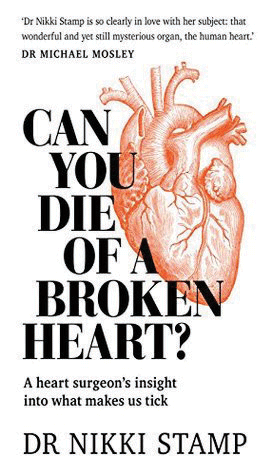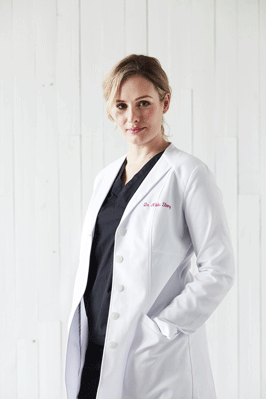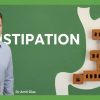Goa is abuzz with excitement as vintage bike and car owners, users, collectors and fans are decking […]

CAN YOU DIE OF A BROKEN HEART?
MIND & BODY, HEART & SOUL, Oct 23- Oct 29 2021 October 22, 2021I COULDN’T resist the title of this book lying in a newly opened cafeteria at Caranzalen and borrowed it. ‘Can You Die Of A Broken Heart’ by Dr Nikki Stamp and intrigued by it borrowed it from the gracious Aishwarya here. You must read this book if you are interested in understanding why your heart behaves like it does physiologically or metaphorically. Mercifully, available in paperbook (Murdoch Books) the book offers oodles of a heart surgeon’s insight into what makes us go tick tock.
Come to think of it we all grow up with my heart this and my heart that as if the heart is a mirror image of what we feel and think and suffer. I’m reminded of a doctor who once told me my heart was in trouble with a deadly T-section blockage and if I got a heart attack I didn’t stand a chance – why, that because I had no faith in God! What God, which God, as if God exists…I fumed for a while. But the older I get the more I wonder why we end up with crock hearts? Is it because we are just so mean, calculating and hurtful to one another and especially to those who are closest – parents, family, relatives? Friends you have loved and had enormous affection for over time, during your growing years and in later years they have caused you much grief?
Yes, we say, our heart is broken because we don’t have a wooden heart and as Elvis sang…maybe we have hearts cast in stone in our times! But to stay with Dr Nikki Stamps and this wonderfully readable book `Can You Die Of A Broken Heart?’ You must read it to come to your own conclusions. If gives you the lowdown and nitty gritty of the heart real and unreal, admit it’s the only organ we talk so much about in life!
Never mind that the heart is no larger than a hand fist and as the author says, “The heart is, at its simplest, a pump. A pump, and also a kind of enigma: its simplicity is possible because of complexities that we’re only just learning about….since 400 BC anatomists and philosophers have debated the significance of the heart. Aristotle rightly deduced that it was the centre of the body’s circulation and a vital organ. Over the centuries the brightest minds have sought to understand the heart –both its physical side and spiritual.”
glorious machine
Dr Nikki takes us through a journey to learn how your heart beats and how to make every one of those beats count. As a child, she says, she was fascinated by the way the human body was put together and how all those cogs fitted to become the glorious machine we call the human body. She has learnt a lot fixing literally broken hearts and proceeds in chapter after chapter to give us a mindboggling idea of the different aspects of the heart as an organ and what happens to stressed-out hearts, about new hearts transplanted and mechanical hearts…the medical mysteries of a woman’s heart (yes, it is different from a man’s heart), also how love can heal, how you can feed your heart, how exercise helps, red wine and dark chocolate and superfoods help.
Plus, how the blues of depression and family affairs and relationships wear out the heart prematurely. We definitely need to understand this organ we call our heart better to take stock of what kind of journey we may be turning life into! There is so much fascinating up to data here to bemuse the mind. For example, did you know the British Heart Foundation as far back as 2001 discovered that we have something in common with zebra fish, like “Zebra fish and humans share quite a large amount of DNA; in fact, we have some very similar genes .”
So an enormous amount of research is underway on how one day we may be able “switch on the genes in humans that zebra fish use to regenerate and repair their damaged hearts. At the moment , the repair genes in our hearts aren’t switched on properly. When the heart is damaged, the repair mechanisms are more like a band aid over a gash: it partially relieves the problem but it isn’t exactly as good as new.” This only the case of the heart, in the rest of our body, say the gut, it can regenerate and blood cells are reborn more often than once in a month!
ZEBRA FISH MAGIC
ALL this and much more. Research is going on in the realm of stem cells and soon we may be able to harvest our own specific organs in an organ-creating factory I suppose. Dr Nikki Stamp says eventually we will be able to borrow “zebra fish magic and regrow and regenerate damaged hearts” by giving them new, healthy cells; also we should not fear such medical research for this whole business of organ donation will end then!
In a nutshell, did you know that the on an average every day the human heart beats at around 70 beats a minute, or 1000,000 beats per day? You probably know that. Educates Dr Nikki Stamp on basics: “Unlike the muscles of our arms and legs, it (the heart) doesn’t tire, it doesn’t need a rest and it doesn’t fatigue. Imagine doing 100,000 bicep curls in a day – we couldn’t. Those muscles would fatigue and die quickly, leaving us with very sore arms. The heart is very clever though, and is not set at just one rate. When you exercise your heart might beat up to 190 times per minute or more; and when you sleep – so your body is using less energy – your heart might slow to 40 beats a minute overnight. Over a lifetime this will add up to over three trillion beats…”
That’s all part of the heart as a brilliantly designed pump or machine or “an appliance that you “set and forget.’” Until something goes wrong! The heart can go wrong, like when a heart attack happens. It’s the most common cause of heart disease. Angina is when the narrowed coronary vessels can’t provide a good blood supply and is similar to a heart attack but without the same severity. Blockages with plaque called atheroma and angina are two diseases often seen as heart disease…in developed countries heart disease kills three times as many women as breast cancer.
The Heart Foundation has discovered that only three out of 10 women worry about heart disease! Heart disease in women is quite different but few have studied this in the last 60 years (that how old exclusive medical research on the heart is). Observes Dr Stamp, “Women have very different symptoms, such as tiredness or shortness of breath doing something that used to be easy. Blockages form differently in a woman’s heart, with its smaller blood vessels and the protection of oestrogen, so the disease and the symptoms are different.” Scientists and doctors still have to focus on how women’s heart diseases need to be treated, very differently from men’s heart diseases.
OF COURSE, there is the matter of how bad a stressful life can be for the heart. Studies have looked at the way the body responds to grief and vis-à-vis cortisol, the much talked about stress hormone. Cortisol is made by two little glands called the adrenals and they sit atop our kidneys. When we feel stressed the brain messages the brain’s hypothalamus area which signals the adrenal glands to release cortisol, “cortisol mobilises your body for a fight” and in the long run impacts the immune system.
This is partly good, “because it stops your body going too crazy with inflammation, which can sometimes cause disease, but it also can reduce your body’s ability to fight off infection. In people who have lost someone closest to them, cortisol levels remain high for up ot six months – so six months of not being able to fight infection. Cortisol also ruins energy stores, and can prevent wounds healing. So, while cortisol is a necessary part of the way our bodies deal with stress, when we flog ourselves with it for too long it can actually make us sick.”
The book offers so many known and little known insights into the psychology of the heart that I renew my recommendation here that you read it! The human heart is such a fascinating, fabulous heart to come to terms with. Don’t turn it into an ugly, insecure part of your psyche or mind set which is oftentimes more to do with fearful imagination-based negatives or so to speak. But that’s my conclusion, my dears after reading Dr Nikki Stamp’s “unputdownable” book on the human heart outside in and inside out…
So can you die of a broken heart? Yes, says the author. From the direct toxic effects of adrenaline in an acutely stressful situation, to the physical symptoms of having your heart broken, the mind and heart are truly connected. A broken heart will not always kill you but it will certainly do no good for your physical wellbeing. The body always tries to be helpful by setting off a cascade of hormones and nervous system responses to be ready to fight for your survival but don’t let these effects hurt your heart for when they hang around for too long they can damage quality of life.
Dr Nikki Stamp puts it so well, “While rough times can be guaranteed, building a resilient body and mind is like taking out an insurance policy for your wellbeing.” Perhaps, we need to decide if our wellbeing is dependent on taking away another person’s wellbeing! If we can get that right I guess we’re okay human beings…. However, the realities of life are the leading causes of stress in life and we must endeavor to turn all malignant realities into benign and generous ones so that we live without too many justifications and yes, the mega guilt trips which follow.
Dr Nikki Stamp’s `Can You Die Of A Broken Heart’ is a deeply engaging book for our sad, anarchic times which put much store by material acquisitions instead of what makes us feel loved, cherished, appreciated and able to share happiness all around. She discusses a lot of issues to do with the physical heart as also the emotional fallout of the happy or unhappy relationships which impact us mind and body, heart and soul – you need to read this book!
On that note it’s avjo, poiteverem, selamat datang, au revoir, arrivecci and vachun yetta here for now.
— Mme Butterfly
Excerpted from ‘Can You Die Of A Broken Heart’ by Dr Nikki Stamp….
Chapter 9
DEPRESSION: CAN A HEART BE BLUE?

‘Mental pain is less dramatic than physical pain, but it is more common and alsomore hard to bear. The frequent attempt to conceal mental pain incarases the burden: it is easier to say “My tooth is aching.” Than to say, “My heart is broken.”’
–CS Lewis, writer, academic and theologian
I SAT in my clinic, ready to see my last patient for the day. He had come for his check-up, six weeks after his heart surgery. I remembered him of course, but it was not an intense, crisp memory. To me, this usually means that surgery has gone well, the patient has recovered easily and returned home. Not remembering specific dramatic details usually means that there were none, which in heart surgery is probably a good thing. I looked through his paperwork and refreshed my memory of his medical issues, noticing that he was a very heavy smoker and had trouble quitting. I made a mental note to see how that was going.
It turned out I didn’t need the mental note. He sat down in my room and the smell of cigarette smoke in the air was thick. I knew that my room would have the distinct odour of smoke for the rest of the day. I asked him how he was going, looked at his wounds and his chest X-rays. Everything looked good. We went through the medications and then he dropped a comment into the conversation that piqued my interest. I’ve been hanging out for this appointment. All I do is sit at home and do nothing.’ I asked him what he meant byhanging out for this appointment,’ and the floodgates opened. He told me that he had had two relationship breakdowns before he was admitted to hospital with a heart attack followed by heart surgery. During his hospital stay his partner had left him, but he had to face the indignity of going back to their shared home after discharge until he could find somewhere else to live. This wasn’t easy because he couldn’t work and so was on a pension that barely covered he cost of rent and food. He had no friends and no family, so he sat at home all day. The only highlights were going to physiotherapy and doctors’ visits. My heart was pained to think that coming to see me, someone he really didn’t know, could pass as a highlight.
I asked, ‘Do you think you’re depressed?’ and he replied, ‘Of course I am, what with everything that is going on. It’s why I can’t give up smoking: what else do I have to do with my time?’
My brief consult turned into a much longer one for two reasons. Firstly, I was so sad for this man who thought that this hospital visit, among the cold, clinical rooms and corridors, was something to look forward to. Secondly, I wanted to sort out his mental state, not just as a person but as a doctor. Depression is a horrible condition to live with; more and more we are learning just how bad depression is for the body. Particularly for the heart. I’m not a psychiatrist but I wanted this man to get better, mind and body, and both needed to be in good working order for that to happen.
(Dr Nikki Stamp is one of only a handful of female heart and lung surgeons in Australia. She holds a Fellowship of the Royal Australasian College of Surgeons in cardiothoracic surgery and trained at some of the country’s busiest hospitals. Dr Stamp has a strong desire to change the way we think about health.)















